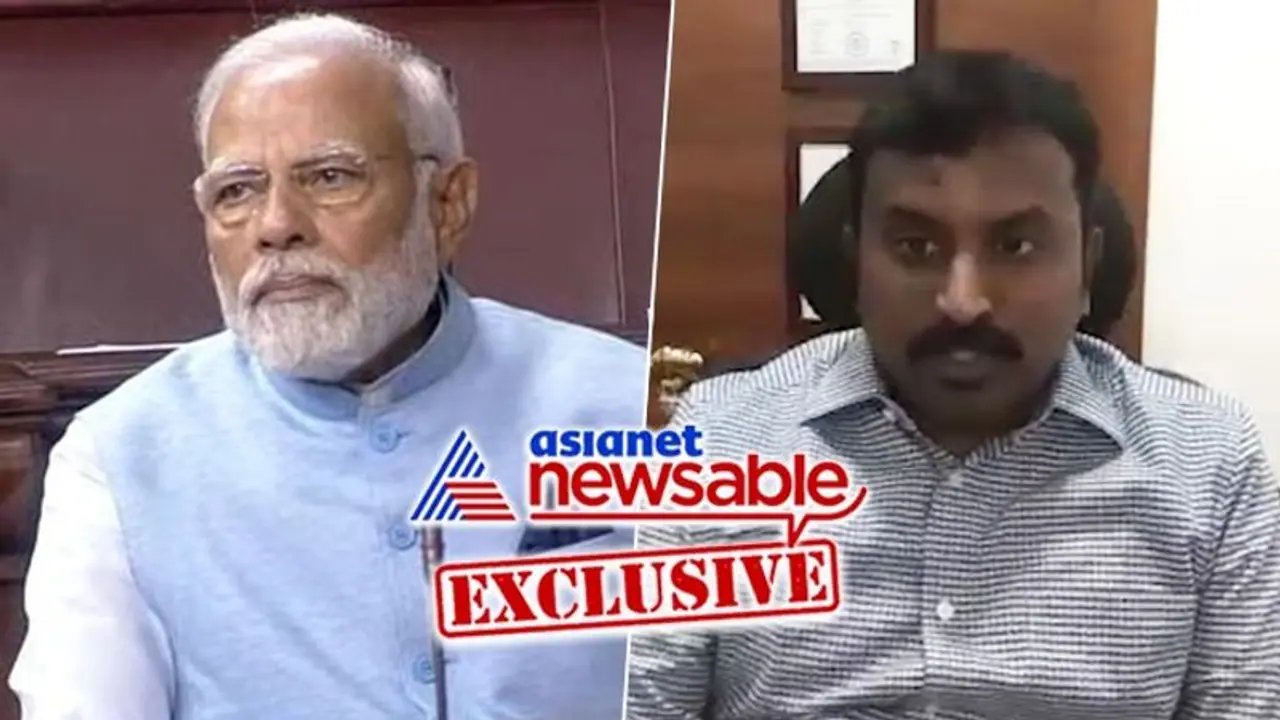Senthil Sankar, the Managing Partner of Shree Renga Polymers, the manufacturer of the special jacket, shed light on the idea behind the sustainable garment and more in an exclusive interview with Asianet Newsable's Gargi Chaudhry.
Prime Minister Narendra Modi recently hit the headlines for wearing a jacket made of material recycled from plastic (PET) bottles to the Parliament. Last Wednesday, the PM was seen wearing a light blue 'sadri' jacket as he sat in the Rajya Sabha for the day's session. The jacket was handed over to the Prime Minister by the Indian Oil Corporation Limited (IOCL) during his February 6 visit to Bengaluru to inaugurate the India Energy Week.

Senthil Sankar, the Managing Partner of Shree Renga Polymers, the manufacturer of the special jacket, shed light on the idea behind the sustainable garment and more in an exclusive interview with Asianet Newsable's Gargi Chaudhry.
Excerpts from the interview:
Also Read | 'Rahul Gandhi cancelled flight': Varanasi airport denies Congress leader's 'no permission' claims
How did you get this idea of manufacturing sustainable garments?
We were manufacturers of recycled polyesters, and we have been doing it for the last 15 years. We take PET bottles and make them into polyester fibres. So then, that fibre is converted to yarn, then to fabric and garments. We have been up to the garment chain and then realised why not introduce our brand and take the message of sustainable fashion across India. India is at a very nascence stage when it comes to sustainability. It was a good point to start a brand, raise awareness, and make people embrace sustainable fashion. We should sensitise the public on this aspect will bring about the change. Now it has gotten much prominence after the biggest endorsement from PM Modi. He has also inspired a lot of MSME people.
Click HERE to watch this interview in Tamil
How did you manufacture this jacket? Please elaborate on the process.
Once you throw these PET bottles, ragpickers pick them and give them to Mandis, where our suppliers take these bottles. Then, the suppliers compress them. After compressing them, they are sorted (Removal of caps and wrapper). After that, they are crushed into flakes. Flakes are then converted into fibres by drying, melting, and other mechanisms. Once it's made into recycled polyester fibres, it's taken into the conventional textile process, which includes yarn and fabric and then cut into the desired shape.
How did your company approach PM Modi?
He chose it himself! We gave him options. Indian Oil Corporation approached us for Indian Energy Week. Before this, we had presented the same jacket in Chandan colour to Hardeep Singh Puri. He wore it and liked it a lot. With PMO, there are a lot of protocols, and we had to send various fabric and colour options. It went through many tests, and we gave him 9 colours, and they chose blue. The IOCL Chairman presented PM Modi with the jacket at the event. We all were pleasantly surprised. I was in a meeting with my staff when my family, friends and media started to ping me and said it had gone viral as he wore it to the Parliament. It was an overwhelming feeling. PM Modi's magnanimity made him respect the work of MSME companies. He has encouraged us with his act and gave a clear message for the environment and sustainability. He is a very proactive and progressive leader. His one act and no words mean a lot to us.
How do we deal with the plastic scenario in India?
Plastics are different types, and we can only do away with them partially. Plastic is necessary, but we need a proper disposal method. We, as citizens, are not responsible for separating and disposing of our waste. We leave it to the ragpickers to segregate waste. When plastics can be recycled, the issue is how we throw them and it comes to the recycler. It can't be done by the industry alone. It has to be done by the public as well as the government.
Any future projects that you are working on?
We are just online and on Amazon and Flipkart. We have yet to think of retail sales. The idea is to spread this message of sustainable garments across India.
Also read: Income Tax department conducts 'survey' at BBC office in Delhi, Mumbai: Report
